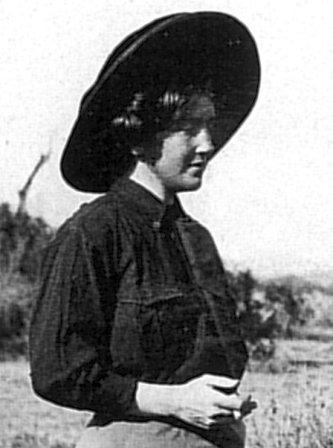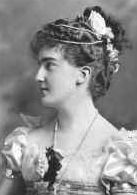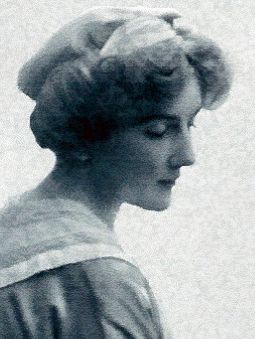View entry
Name: DELAMERE, Florence Anne, Lady



Nee: Cole, dau of 4th Earl of Enniskillen, sister of Galbraith and Berkeley Cole
Birth Date: 3 Feb 1878 Florence Court, Enniskillen
Death Date: 17 May 1914 Nairobi
First Date: 1903
Last Date: 1914
Area: Njoro, Equator farm
Married: 11 July 1899 Hugh Cholmondeley, 3rd Baron Delamere (1870-1931)
Children: Thomas Pitt Hamilton (19 Aug 1900 Whitegate, Cheshire-13 Apr 1979 Soysambu)
Book Reference: Best, Midday Sun, Markham, White Man, Land 1903, Tobina Cole, Hut
General Information:
Best - Lady Delamere busied herself with running the house, feeding the poultry and attending to the various pigs which thrust inquisitive snouts into her hand. An acquaintance described her at this time as 'very lovely, graceful and charming, and quite out of place in this savage country'. Whenever she had a spare moment, she was attempting to start a garden - roses, carnations, irises and cannas grew like nobody's business in the fertile soil ,,,,,,,,, But more often than not, she was fully occupied coping with D's crazy schemes, such as his plan for starting an ostrich farm.
Midday Sun - 'She had all the charm, wit and sparkle expected of the Irish, as well as generosity of spirit and loyalty to a husband who, while not unkind or probably unfaithful, gave more of his heart to his dreams and schemes for the growth of his adopted land than to his wife's happiness. After a gentle upbringing at Florence Court in County Fermanagh, she was dumped down in a mud hut without doors or windows amid wild animals, Masai warriors and herds of cattle, far from telephones or doctors or any contacts with what we call civilization, and left alone for weeks or even months on end to act as farm manager. ....... Certainly Florence D. did not complain, but she must have lacked companionship, she was never strong, her health suffered and she was separated at an early stage from her only child. ....... After her death, her brother Galbraith wrote of Soysambu: 'There's something about it that always depresses me and I can't help thinking that my sister must have hated it. There's somehow a sort of bareness about D's surroundings that I can't explein.'
White Man - early 1911 - Lady Delamere returned to England for a holiday and collapsed on her arrival with a nervous breakdown. .......... 1914 - May - Lady D. died. She was only 36. Her courage and gaiety in the face of many troubles and disappointments had won the admiration of all who knew her, and her death was a very real sorrow to E. Africans.
Land Grant 1903 - Lady Delamere - Agricultural, 635 acres - Kiambu Road - Nov. 14 - 99 years leasehold
Tobina Cole writes - she always sounds entrancing, small with auburn hair and green eyes, with all the Irish wit and fire.
Nairobi South cemetery - Florence Anne Cholmondeley (Lady), buried 17 May 1914 - body exhumed and taken up-country 21 Mar 1950
Markham - Dies following 2 years of rumours about her mental state and of her love for Dr. Atkinson - people said she would leave Delamere for him.
Old Africa - 25-8-14 - Christine Nicholls - Florence Anne Cole was born on 3 February 1878, the daughter of Lowry Egerton Cole, 4th Earl of Enniskillen, and his wife Charlotte Marion Baird. She had a childhood of privilege and aristocratic ease, in the elegant surroundings of her father’s country house, Florence Court, County Fermanagh. Her father was MP for Enniskillen, and she had two sisters and three brothers. We first hear of her at the Duke of Devonshire’s costume ball in 1897, and it was shortly afterwards, when she was staying at the Delamere home at Vale Royal in Cheshire, that she met Hugh Cholmondeley, 3rd Baron Delamere, who was laid flat on his back for several weeks after a riding accident. Delamere fell in love with her and the couple married on 11 July 1899.
Delamere had been seduced by Africa and its hunting possibilities and he decided to show the continent to his wife soon after his marriage. The pair arrived in Mombasa and travelled upcountry as far as they could, collecting birds for the British Museum. They then returned to England and Florence gave birth to a son, Thomas Pitt Hamilton, on 19 August 1900. When the child was two he was left in England while his father and mother went once again to East Africa, this time permanently. Quite what Florence felt about abandoning her baby can be imagined, but this was a different era and it was common for aristocratic children to be brought up by nannies.
Delamere was allocated land at Njoro, and Florence’s first home was a grass hut. After a few months she moved to a wooden hut, with beaten earth floors, without a door or windows. A few pieces of Vale Royal furniture stood incongruously at angles around the walls. Florence must have been very lonely, until Charles Clutterbuck became her neighbour. Charles had a daughter Beryl, who treated Florence as a surrogate mother after her own had departed. This was the girl who was to find fame with her book West With the Night. Florence busied herself with the farm poultry and ostriches (ostrich feathers were a fashionable hat accessory at the time). She gathered an extensive library, so she must have spent much time reading. People commented on her charm, sparkle, wit, and vivacity, all of them lost on the husband who was so often absent for months at a time and was, by all accounts, rude to her. She enjoyed one cheerful fortnight when Theodore Roosevelt stayed at the farm – he commented on her extensive library. When trouble brewed among local tribes Florence, alone as usual, borrowed 200 cartridges from Charles Clutterbuck in case she was attacked. She did not have to use them.
Her life improved slightly when the Njoro farm failed and Delamere moved to Soysambu, a farm in the Rift Valley, in 1910. By now Delamere had encouraged two of Florence’s brothers, Galbraith and Berkeley, to come to Kenya in 1903. Galbraith farmed next door to Soysambu, at Kekopey, and Berkeley bought land at Naro Moru. Galbraith said of Soysambu: ‘There’s something about it that always depresses me and I can’t help thinking that my sister must have hated it. There’s somehow a barrenness about D’s surroundings that I can’t explain.’ Florence must have been very upset when Galbraith was banished from the colony in 1911 after shooting dead a sheep-rustler on his farm (he was pardoned and returned in October 1914, after war broke out). It may have been such adversity as this, combined with loneliness and her husband’s neglect, that led Florence to have a nervous breakdown when she arrived in England for a holiday in 1911.
Florence loved hunting, dancing and society. These delights were seldom available to her, though we do find her wearing a red velvet dress at a Nairobi ball in 1906. Delamere was always short of funds and scrutinised closely all items of expenditure, so Florence was unable to indulge in any spending sprees. She bought some land of her own, between the Ruaraka river and the Kiambu road, though she nearly lost it in 1905 when she was told to occupy it or it would be forfeited (Kenya Gazette, 1 January 1905).
After her breakdown Florence returned to Kenya, but Delamere became ill in mid 1913 and was ordered to England. Florence herself was not well – her heart was failing. She found she could walk scarcely more than 100 yards. For a while she struggled on alone at Soysambu but eventually friends persuaded her to stay with them in Nairobi. Two days after Delamere returned from England Florence died, on 17 May 1914. She was buried three days later in Nairobi South cemetery, but in 1950 her body was exhumed and taken upcountry.
Cranworth: If D[elamere] was a remarkable character, no less remarkable was his wife Florence. I do not think that I have ever met a more delightful companion or a more devoted wife. She loved hunting, dancing, every form of society and every joy of life. Yet she shared an existence of the utmost discomfort without any one of these amenities with the utmost cheeriness. On their personal expenditure... the very closest watch was kept. Two poor mud huts, which would have been condemned instanter by any housing authority in England, served them for years, and there was no garden nor indeed any other amenity whatsoever. D. was away nearly all day and every day on the farm and about his various enterprises and until the coming of the Clutterbucks she had a very lonely life.
